|
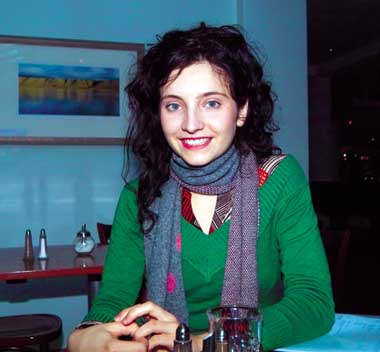
ABOVE: Carla
Bergs. RIGHT: Bergs’s collection
at ID Dunedin Fashion Week.
 INCE
we began covering ID Dunedin Fashion
Week, we’ve spoken to new labels getting nurtured at the Fashion
Incubator become established ones the following year. In the spirit
of collegial respect, they are promoted by bigger names, who understand
that everyone has a right to pursue their passion. In short, we
like Dunedin. INCE
we began covering ID Dunedin Fashion
Week, we’ve spoken to new labels getting nurtured at the Fashion
Incubator become established ones the following year. In the spirit
of collegial respect, they are promoted by bigger names, who understand
that everyone has a right to pursue their passion. In short, we
like Dunedin.
It’s probably easier to start up a label there
than anywhere else in the world, thanks to a population willing
to try new things. It makes total sense to have Dunedin host an
emerging designers’ show. The Octagon—the city’s centre—was shut
while a marquée was erected to house the show. By the end
of the evening, we were asking organizers why the Vodafone ID
Dunedin Emerging Designers’ Awards could not take place over two
nights and be a greater international event.
Graduates from Otago Polytechnic were joined by
those from AUT, the Whitehouse Institute
of Design, RMIT and the Queensland
University of Technology. But we foresee it being truly international
rather than trans-Tasman: why not, some day, have Mittelmoda, FIT,
Parson’s, NIFT and Central St Martin’s
involved?
What we saw that evening was more impressive than
the work of many established designers. Our top picks were the Queenslanders,
who seem to have thrived being away from Australia’s usual fashion
centres in Melbourne and Sydney. Carla Bergs’s collection, the Picnic
Exodus, took home the first prize—unsurprisingly. A hood containing
three baguettes became a make-shift picnic blanket; becoming the
model’s parachute as she ran down the catwalk. A belt with multiple
pockets could be carried as a bag. There is no exaggeration, no
giving of a false hope, when we say that Bergs’s collection was
one of the best we had seen on any catwalk anywhere, regardless
of how long the designer had been in business.
Lucire was the first to interview Bergs
after her victory. ‘I’m overwhelmed. All the judges were gushing.
It’s so nice,’ she said in her gentle Australian voice, still with
some disbelief.
The philosophy behind Bergs’s designs is one of
entertaining others, so it appears that karma is returning a favour.
‘I like to make people smile. Fashion can bring humour and flamboyance.
I like to play it up. Too much of fashion takes itself too seriously.
‘Life is to be enjoyed. The world is to be enjoyed.’
Bergs is a designer who wishes to bring meaning
into fashion. She steers away from appropriating ideas and wishes
her work to be accessible, even to those who may not be fashionistas.
To do that, her work is both sculptural and wearable.
The same playful voice comes into her designing.
The Picnic Exodus was meant to bring a ‘pastural, outdoor feel.
Liberation is a recurring theme.’
She admits that a lot of thought went into her
collection’s concept. ‘It’s liberating in Brisbane in summer. I
did not want it to be too serious. I wanted it to be fresh.’ To
her, the picnic was the perfect metaphor: ‘[it’s about] simple pleasures
and freedom. You pack your own meal—it’s anti-consumerist.’
This ties in to Bergs’s ideas about a ‘harmless,
playful rebellion.’ She sees consumerism as leading to conservative
design, as designers play things safe to appeal to a broad base.
By being rebellious, fashion can confront people more, which may
initially seem contradictory to her thoughts about accessibility.
But witnessing her work on the catwalk shows that a happy medium
can be found: Bergs will do well because she produces work that
surprises, yet can be worn by even the less adventurous.
She describes the look as being a slicker and
sexier ‘hippie look’, turning her gingham and rose prints into something
more desirable, elevating humble fabrics.
‘I care about shapes. I don’t like literal things,’
she said.
For Bergs, Paris is a medium-term dream. It is
not unattainable: her father is Dutch, so her plan is to venture
to Europe with a Dutch passport. ‘It’s important to get exposed
to different cultures. It’s part of the dialogue.’
We suggested to Bergs that she get used to being
interviewed, as it’s a total certainty her name will emerge often
in the media in years to come. •
Jack Yan is founding publisher of Lucire.
|
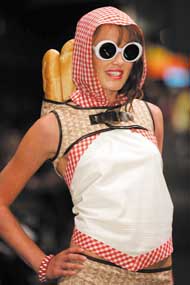 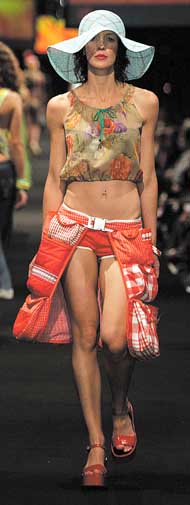 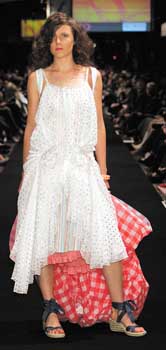 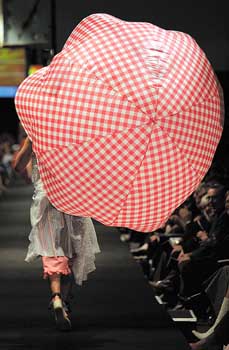
|
 See
the full story with interviews with young designers Anjali
Stewart, Marcia Hudson and Tara Viggo in the May 2005 print
edition of Lucire, out in New Zealand on May 9. It
also includes a full Vodafone ID Dunedin Fashion Weekend report. See
the full story with interviews with young designers Anjali
Stewart, Marcia Hudson and Tara Viggo in the May 2005 print
edition of Lucire, out in New Zealand on May 9. It
also includes a full Vodafone ID Dunedin Fashion Weekend report.
To make sure you don’t miss out, click on the image at
right to subscribe or buy a single copy. (Click 'Yes' if pop-up
boxes appear—you're being switched to our secure server
and it is completely safe.)
|
|

